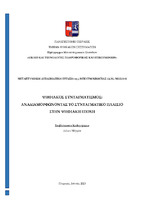| dc.contributor.advisor | Μήτρου, Λίλιαν | |
| dc.contributor.author | Μπόγρη, Νικητία | |
| dc.date.accessioned | 2023-09-07T08:09:10Z | |
| dc.date.available | 2023-09-07T08:09:10Z | |
| dc.date.issued | 2023-06 | |
| dc.identifier.uri | https://dione.lib.unipi.gr/xmlui/handle/unipi/15685 | |
| dc.identifier.uri | http://dx.doi.org/10.26267/unipi_dione/3107 | |
| dc.description.abstract | Η παρούσα διπλωματική εργασία πραγματεύεται τον ρόλο του ψηφιακού συνταγματισμού ως προς την αναδιαμόρφωση του συνταγματικού πλαισίου στο ψηφιακό περιβάλλον. Αρχικά, καταπιάνεται με τον ορισμό και τις αποστολές του ψηφιακού συνταγματισμού (Κεφάλαιο 1 & Κεφάλαιο 2). Αναλύονται οι δύο εκφάνσεις του ψηφιακού συνταγματισμού, δηλαδή η εξωτερική πλευρά του, η οποία εκδηλώνεται με κείμενα πρωτοβουλιών ανάπτυξης θεμελιωδών δικαιωμάτων στο διαδίκτυο (Κεφάλαιο 3), και η εσωτερική πλευρά του, δηλαδή η αντιμετώπιση της εμφάνισης ανεξέλεγκτων δυνάμεων στην ψηφιακή κοινωνίας από την εκάστοτε έννομη τάξη με βάση τη συνταγματική παράδοση κάθε τόπου (Κεφάλαιο 4). Έπειτα, περιγράφεται η αντίδραση του ψηφιακού συνταγματισμού -εσωτερική και εξωτερική- στις δύο μεγάλες νομικές προκλήσεις της ψηφιακής επανάστασης, δηλαδή τη συνταγματική αντιμετώπιση της ελευθερίας της έκφρασης στο διαδίκτυο (Κεφάλαιο 5) και την προστασία δεδομένων προσωπικού χαρακτήρα (Κεφάλαιο 6). Τα δικαιώματα αυτά επιλέχθηκαν επειδή έχουν αμφίδρομη σχέση. Η μελέτη αφορά κυρίως το ευρωπαϊκό πλαίσιο αντίδρασης -με αναφορά και στην ελληνική έννομη τάξη-, ανά περίπτωση συγκρινόμενο και με την αμερικανική συνταγματική παράδοση. Τέλος, ακολουθούν το Συμπέρασμα (Κεφάλαιο 7) και η Βιβλιογραφία (Κεφάλαιο 8). | el |
| dc.format.extent | 112 | el |
| dc.language.iso | el | el |
| dc.publisher | Πανεπιστήμιο Πειραιώς | el |
| dc.title | Ψηφιακός συνταγματισμός : αναδιαμορφώνοντας το συνταγματικό πλαίσιο στην ψηφιακή εποχή | el |
| dc.type | Master Thesis | el |
| dc.contributor.department | Σχολή Τεχνολογιών Πληροφορικής και Επικοινωνιών. Τμήμα Ψηφιακών Συστημάτων | el |
| dc.description.abstractEN | This master’s thesis deals with the role of digital constitutionalism in the reshaping of the constitutional framework of the digital environment. To begin with, the thesis deals with the definition and the missions of digital constitutionalism (Chapter 1 & Chapter 2). It analyses the two sides of digital constitutionalism, namely its external point of view, manifested in the texts of initiatives for fundamental rights online (Chapter 3), and its internal point of view, i.e. the reaction to the emergence of uncontrolled powers in the digital society based on the constitutional tradition of each legal system (Chapter 4). Afterwards, this paper describes the reaction of digital constitutionalism -external and internal- to the two major legal challenges of the digital revolution, namely the constitutional reaction of the online freedom of expression (Chapter 5) and the protection of personal data (Chapter 6). These two fundamental rights were chosen because they affect each other in a bidirectional manner. The study concerns mainly the European framework of reaction -with reference also to the Greek legal system-, compared where applicable to the American constitutional tradition. Finally, this thesis presents its Conclusion (Chapter 7) and the Bibliography (Chapter 8). | el |
| dc.contributor.master | Δίκαιο και Τεχνολογίες Πληροφορικής και Επικοινωνιών (MSc in Law and Information and Communication Technologies) | el |
| dc.subject.keyword | Ψηφιακός συνταγματισμός | el |
| dc.subject.keyword | Σύνταγμα | el |
| dc.subject.keyword | Ψηφιακή εποχή | el |
| dc.subject.keyword | Θεμελιώδη δικαιώματα | el |
| dc.subject.keyword | Δεδομένα προσωπικού χαρακτήρα | el |
| dc.subject.keyword | Ελευθερία του λόγου και της πληροφόρησης | el |
| dc.date.defense | 2023-07-24 | |


